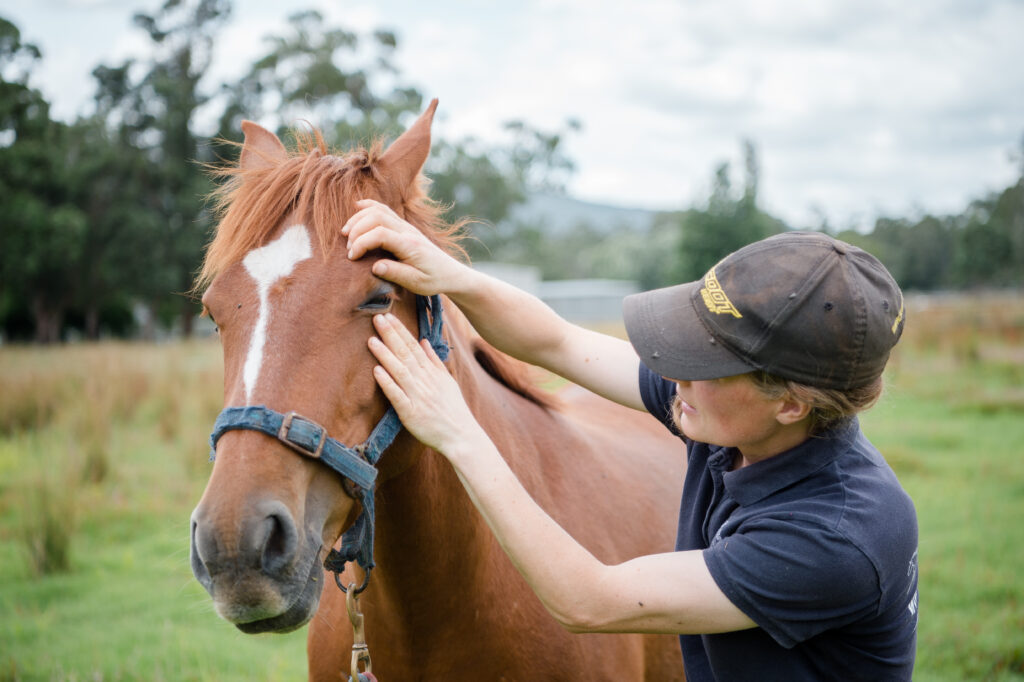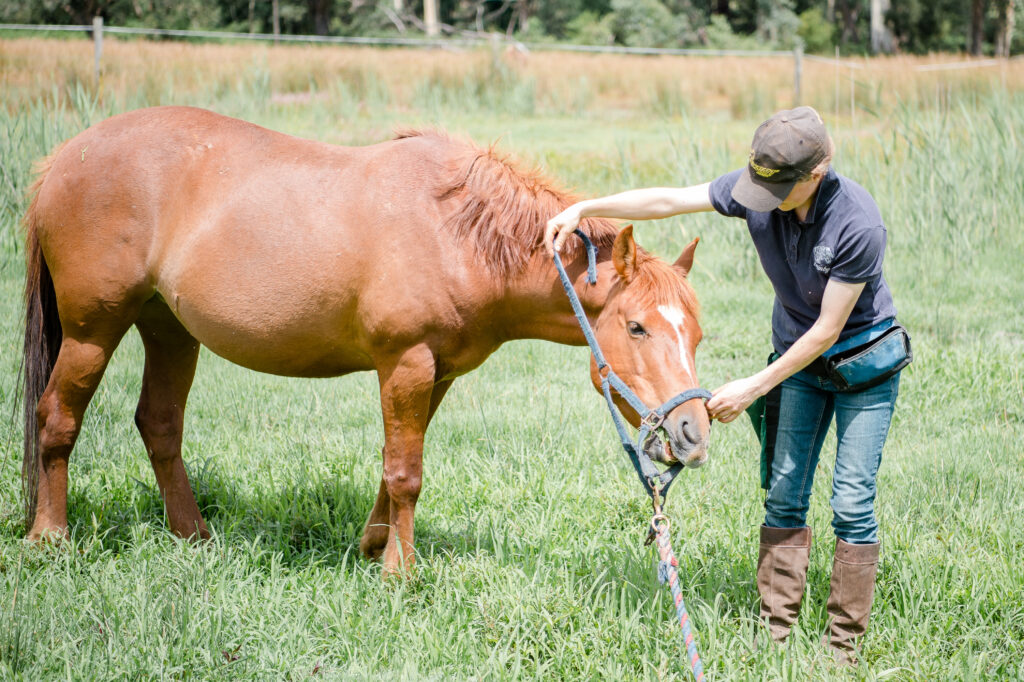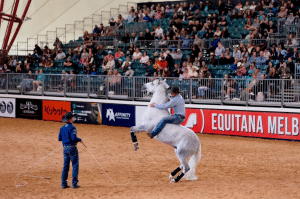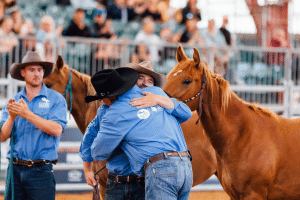Presented by Tanya French:
An Introduction To Cooperative Care
Do you know the feeling of dread when you have to give your horse a vaccination and they just hate needles? You hate needles, you pay the vet to do the needles, but your horse knows the vet is all about needles, and scary things and it all just ends up in a stressful battle of strength and wills.
The same can be said of farrier day because you’ve been through so many and they won’t come back because your horse is so difficult to trim, or the professional can’t provide quality care because your horse just can’t stand still for them.
De-worming is a nightmare. If you can even get the paste near the horse will they swallow it or just spit it out, by the time you’ve finished wrestling with them you probably have more paste on you then the horse has in their mouth.
I know many people who have been injured, some very seriously, trying to do basic care with their horse/donkey/mule, and too many with animals who don’t receive the care they need because they are too dangerous, frightened or difficult to handle.
Cooperative care is a way of training all these behaviours in a way that not only makes the animal tolerate them, but also come to look forward to and enjoy them.
It’s a simple and yet complicated thing.
It takes dedication and skill to train your horse to be able to do these everyday and sometimes emergency tasks.
But we owe it to them. And can you imagine all these things being a joy and a way to build trust and connect with your horse/donkey/mule?
I used to hate worming day with a passion and now it’s so much fun to see all the horses lining up for their turn. I always video it because I still have to pinch myself a little to see them happily eating the intense smelling paste and then asking for more.
So what is Cooperative care? It’s a way of training the animal in a way that allows them choice and control over their own body. They are allowed to say no. This is where the magic happens. The training is done completely at liberty using force free methods. That means we use no pressure in the form of negative reinforcement or positive punishment. No coercion, pain, or threats. Some of the things I have trained with cooperative care are: hoof care, worming, vaccinations, eye care, haltering and leading, grooming, clipping, floating, vet procedures like standing on blocks for X-rays, tooth inspecting, body targeting to position their body where you need it and touch acceptance.
It’s a common argument that you can’t train without pressure. You absolutely can, look at the training done on another species. Equines are the only species who are trained predominantly with pressure based methods. Zoos have been training with force-free methods for years and they have some pretty dangerous animals to work with in there.
So if we don’t use pressure or “energy” to get the horse to do things what do we use? The answer is Positive Reinforcement. Positive meaning the addition of something and Reinforcement meaning the behaviour is strengthened and more likely to be repeated.
For equines, this means food.
I’ll talk you through how I used Positive Reinforcement to train my horses to love worming paste.
I’ve found for most of those that I’ve trained, the difficult behaviour doesn’t always come from the taste of the paste, it comes from being restrained and forced to have the tube in their mouth. Something that you’ve likely never practiced or trained for, but the horse is expected to comply.
So the horses mostly fell into two categories, those who were frightened by the restraint, and those who really disliked the taste.
For those who didn’t like the restraint that was easy. I stopped using halters on them and started to make worming time something to look forward to.
For the ones who didn’t like the taste, I had to reinforce them trying it. So them eating something unpleasant was positively reinforced, until we had built up enough positive association with the taste that they started to enjoy it.
Most of the time I train with simple foods like Lucerne chaff, but for worming day I brought out the special stuff, carrots and pellets.
I use social learning, the horses watching each other, to help change the way they feel about the paste.
Training this way you can train in protective contact (with a safety barrier between) so you both feel safe and in control.
For some I taught them to take the tube in their mouth. This could mean starting with it just being on the ground if they were really scared, for others I could use it as a target and slowly shape the behaviour so they ended up holding the tube in their mouth long enough that I could dispense the paste. This didn’t work for those who hated the taste so I had to work out another way for them.
For those horses, I started with counter conditioning the smell of the paste, counter conditioning is changing the way we feel about a thing.
I did this by letting them smell the paste, maybe from a distance at first and generously offering food, I would slowly bring the smell closer until I might wipe the end of the open tube on the food I was offering. If the horse showed no signs of objection I might put the tiniest amount onto the handful of food I was offering and slowly build it up, offering a handful or more of “clean” food after each which had paste in them.
This reinforced them eating it and started to make them enjoy and look forward to it.
I was able to build it up so I could feed quite large amounts of paste in each handful.
Because I’d built it up slowly and counter conditioned the taste, the horses didn’t spit it out.
I did learn that for some I needed to train with different bands of paste, apparently certain little brumbies love really gross smelling equest but don’t like oat flavour if it hasn’t been appropriately trained!
Positive Reinforcement is for us as well as the animals and being able to enjoy all these interactions is a great source of joy and pride. Knowing that my animals can live in our world, safer and with less stress.
Living with anxiety myself I know what it feels like to worry about things all the time. If we can take something that can be really traumatising, painful and stressful and make it enjoyable, dopamine producing and connection building … well there’s no reason not to.
It can be done in as little as 5-10 minutes a day and will enrich both you lives.
Link to YouTube video https://youtu.be/nOv1j726HSs?si=wvV-K7vtguL57FeP
LINKS:
